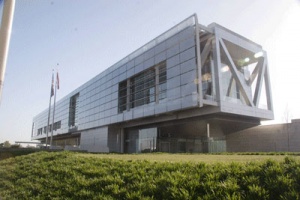Welcome to FranaWiki,
Home of the Clinton Presidential Center & Little Rock Memory Project, documenting various aspects of the Clinton Library & downtown Little Rock history.
3,332 articles created by contributors
|
|
|

Exterior of Clinton Library. Photo by James Hyde.
On November 18th, 2004, the Clinton Presidential Center opened to one of the most incredible parties Arkansas has ever seen. There were 40,000 invited guests, a performance by Bono and The Edge, and the state’s largest fireworks show ever. Celebrities and dignitaries came for the Library opening, and all living United States presidents, but one, were in attendance.
How exactly did this library come to Little Rock? Who contributed to the effort, and what challenges did they face? How was the site selected? Who were the architects? What was the experience of the staff of the Clinton Foundation? What difference has the Library made for musicians and artists? How has it transformed Downtown Little Rock and the economy of Central Arkansas generally? In 2006, students in the Honors College at the University of Central Arkansas began the Clinton Presidential Center & Downtown Little Rock Memory Project to find out. This wiki documents the people who made it happen, as well as important places, events, and mile-markers along the way.
Featured article
|
|
Ceilings Plus created environmentally friendly metal and bamboo ceilings for the Clinton Library. The perforated and non-perforated aluminum ceiling panels are made primarily from recycled soda cans (~75 percent). The custom-made Arboreal® carbonized bamboo ceiling covers 9,000 square feet. Polshek Partnership selected bamboo for the ceilings as it is a "rapidly renewable" building material. The aluminum and bamboo ceilings helped the Library achieve LEED certification by the U.S. Green Building Council.
|
Did you know?
|
|
The Arkansas Museum of Discovery is a children's science and history museum in the heart of the Little Rock River Market. The museum was founded on Main Street in 1927 by Julia Burnell (Bernie) Smade Babcock under the name of the Museum of Natural History and Antiquities. The original artifacts were donated by missionaries. One of the most popular artifacts on display was the so-called "Head of a Chicago Criminal."
The City of Little Rock acquired the museum at Christmastime in 1929. The City moved the museum to the Tower Building of the Little Rock Arsenal in 1942. In 1964 the museum became the Museum of Science and Natural History. The name changed again in 1983 to the Arkansas Museum of Science and History. In 1998 the museum officially became the Museum of Discovery: Arkansas' Museum of Science and History and reopened in its current location in the River Market District. The new museum cost $10.6 million.
As the oldest museum in Little Rock, it continues to educate people of all ages. The museum has both permanent and seasonal exhibits that encourage children to learn using hands-on experiments with electricity, robotics, light and color, anatomy, architecture, and state history. During a week of celebration in anticipation of the opening of the Clinton Library in November 2004 U.S. Senator John Glenn opened an exhibit on "Space and the Presidency" at the Museum.
The Museum of Discovery was accredited by the American Association of Museums in 1993 and became a Smithsonian Affiliate in 2003. It is also the center for the Arkansas Discovery Network, a program affiliated with the Donald W. Reynolds Foundation.
|
|
In the news
|
|
Little Rock Police have a brand new tool to fight crime, segways. They have two that officers will use to patrol the River Market area. Police will also use the new vehicles to fight crime in other parts of the city. Read more
|
This month in history
|
|
On February 23, 2005 approximately 100,000 pages of Clinton administration domestic policy documents were made available to the public. The records included information on the President's initiatives in welfare reform, health care, education, employment, and the arts. The Library Archives also released material on the Commission on Holocaust Assets, which was set up to determine the distribution of assets of World War II victims in America following the war. More from the timeline
|
|

Little Rock panorama, looking west from Clinton Presidential Center and Park. Photo by Nima Kasraie.
Project Collaborators
- Oral History Methods: Phil Frana
- Administration, Grantmaking, Professional Best Practices: Amanda Allen
- Administrative Assistant: Blake Bowman
- Video Production: Eric Deitz
- Production Assistant: Allison Yocum
- Photography: James Hyde
- Interviews: Courtney Bennett, Ben Dobbs, John Greene, James Hyde, Adam Lucas, Ryan Morrow
- Wiki Administration: Thomas Bertram
- Knowledge Engineer: Megan Davari
- Wiki authors: Fabia Bertram, Blake Bowman, Nicholas Coelho, Megan Davari, Casey Gambill, John Lenehan, Jeremy Morgan, Maegan Murphy, Micah Ray, Allison Yocum
Other links of interest

